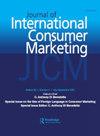消费者对国内外产品失败反应的跨文化研究
IF 2.8
Q3 BUSINESS
引用次数: 0
摘要
摘要本研究探讨消费者民族中心主义(CET)和产品失效类型如何影响消费者对国产和进口产品失效的态度。本文还探讨了产品失效对原产国(COO)形象的影响,以及文化差异对产品失效容忍度的影响。在美国和中国进行了两个实验。采用回归和结构方程模型分析对假设进行检验。研究结果包括:第一,CET影响对产品失败的态度;②失效类型既有主要作用,也有调节作用;第三,无论故障类型和产品来源(国产还是进口)如何,COO形象都会随着故障经历而波动;最后,中国消费者比美国消费者更能容忍失败。从理论上讲,作为第一项研究,本研究区分了两种产品失效类型(能力与道德),并证实了失效类型对态度既有主要影响,也有调节作用。它还扩展了CET的预测能力的范围,通过经验证实CET可以影响对产品的态度,即使有失败。在管理上,处理道德失误比处理能力失误更需要付出努力。当一家公司的产品失败时,来自同一国家的其他公司应该积极应对。如果一个产品在美国和中国市场都失败了,就应该在美国市场投入更多的精力来恢复。本文章由计算机程序翻译,如有差异,请以英文原文为准。
A Cross-Cultural Investigation on Consumer Responses to Failures of Domestic and Foreign Products
Abstract This research examines how consumer ethnocentrism (CET) and product failure type affect consumers’ attitudes toward domestic and imported product failures. It also explores product failure’s impacts on country-of-origin (COO) image, and cultural difference in product failure tolerance. Two experiments in the U.S. and China were conducted. Hypotheses were tested using both regressions and structural equation modeling analyses. Findings include, first, CET affects attitudes toward product failures; second, failure type has both main and moderating effects; third, COO image fluctuates with failure experience, regardless of failure type and product origin (domestic or imported); and finally, Chinese consumers are more failure tolerant than U.S. consumers. Theoretically, as the first study, this research differentiates two product failure types (competence versus ethical) and confirms that failure type has both main and moderating effects on attitudes. It also extends the scope of CET’s predictive power by empirically confirming that CET can affect attitudes toward products even with failures. Managerially, more effort is needed in handling ethical than competence failures. When a firm’s product fails, other firms from the same country should react proactively. If a product fails in both the U.S. and Chinese markets, more recovery efforts should be invested in the U.S. market.
求助全文
通过发布文献求助,成功后即可免费获取论文全文。
去求助
来源期刊
CiteScore
7.60
自引率
6.10%
发文量
29
期刊介绍:
The Journal of International Consumer Marketing examines consumer and organizational buyer behavior on a cross-cultural/national and global scale combining up-to-date research with practical applications to help you develop an action plan for successful marketing strategy development. Business professionals, policymakers, and academics share insights and "inside" information on a wide range of cross-cultural marketing issues, including international business customs, negotiating styles, consumer brand loyalty, price sensitivity, purchasing and leasing, consumer satisfaction (and dissatisfaction), and advertising.

 求助内容:
求助内容: 应助结果提醒方式:
应助结果提醒方式:


